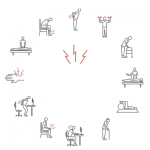NEW YORK (Reuters Health)—In patients with chronic musculoskeletal pain, an increase in opioid dosage appears to be of no clear benefit, according to a two-year study.
As Benjamin J. Morasco, PhD, tells Reuters Health by email, “When we followed patients with chronic pain, who were already prescribed long-term opioid therapy, we found patients as a whole did not experience long-term clinically significant improvements in pain or functioning following prescription opioid dose escalation,”
These results, he adds, “suggest opioid dose escalation is unlikely to be a successful approach to chronic-pain management.”
Dr. Morasco of the VA Portland Health Care System, Oregon, and colleagues tracked 517 patients who were receiving long-term opioid therapy with a stable dose at baseline.
The participants self-reported measures of pain, disability, depression and potential adverse effects at baseline and every six months for two years.
Over the course of the study, 19.5% of participants had prescription opioid dose increases, the researchers report in Pain.1 Escalation was defined as an increase in the daily morphine-equivalent dose of 15% or more from baseline lasting at least 56 days.
After controlling for covariates, there were no significant changes on any variable following dose escalation and only 3% of this group experienced a clinically meaningful improvement in pain.
During the study period, participants overall experienced small improvements in pain intensity, depressive symptoms and side effects and a lower risk of prescription opioid misuse. However, sexual functioning significantly worsened over time.
The researchers conclude that the outcome “supports an important change in the approach to long-term management of pain with opioids, providing added support for Centers for Disease Control and Prevention recommendations to limit dose increases.”
However, Dr. Morasco also stresses that “there are important limitations to the study that should be considered. Notably, we did not randomize patients to receive opioid dose escalation. Thus, we cannot draw causal conclusions.”
“It is possible that opioid dose escalation may have helped people to maintain pain at their baseline level,” he adds, “and without a dose increase, their pain may have worsened; our study design would not have been able to identify this.”
David A. Edwards, MD, PhD, chief of the division of pain medicine at Vanderbilt University Medical Center, Nashville, tells Reuters Health by email that historically, research on this topic has been inadequate.
“The authors here designed a study to provide higher-quality medical data about the usefulness of increasing opioid dose to treat chronic pain,” he says. “An important part of this study was that the patients themselves reported how they felt and how they were doing. The patients with chronic musculoskeletal pain already on moderate dose opioids said, on average, that pain and function did not get better when opioids were increased.”


